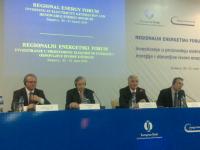 The member states and institutions of the European Union are keeping a close eye on the rich energy potential of the Balkan countries, Western officials have said, urging local leaders to undertake necessary reforms and unlock this sector for potential investments.
The member states and institutions of the European Union are keeping a close eye on the rich energy potential of the Balkan countries, Western officials have said, urging local leaders to undertake necessary reforms and unlock this sector for potential investments.
This message was delivered by several senior EU officials on Monday, at the opening of the two-day Regional Energy Forum in Sarajevo. The forum has also gathered representatives of the countries in the region, as well as leading energy experts.
“We see fascinating opportunities in the Balkans,” Thomas Mirow, president of the European Bank for Reconstruction and Development, EBRD, said in his opening remarks.
In a clear sign of its growing interest in this sector, EBRD on Monday also publicly launched two new instruments, which will provide up to €110 million for investment in the energy sector across the western Balkan states. About half of the funds will be provided directly to private companies, while the rest will be given to firms and households by means of on-lending through commercial banks.
Mirow and the EC Commissioner for Energy, Andris Piebalgs, spoke of the huge potential they perceive in the Balkans for renewable sources of energy, such as small hydroelectric, solar, and wind power plants. They quoted estimates by World Bank experts who claim that the Balkan states have the potential to use up to €20 billion in investments on improvements and new constructions in the power sector before 2020.
Energy efficiency and renewable energy sources are the main themes of the two-day regional forum, and will also be the main focus of the new lending instruments presented today.
Developments and modernization of the energy sector in the region may be crucial at a time of worsening economic and social situations in the world, local and international officials agreed.
“The development of the energy sector should serve as one of the methods for the recovery of the economic growth,” Nikola Spiric, Bosnia’s Prime Minister, said in his opening remarks.
Yet, in order to unlock and use this potential, both Mirow and Piebalgs stressed that Bosnia and other Balkan countries will have to quickly and thoroughly reform their business and energy sectors to facilitate the creation of a regional energy market.
Piebalgs stressed that the EU is especially “worried” by the ongoing problem with the development of Bosnia’s state power transmission company, which has been blocked for more than a year by political fighting between Bosnia’s two entities.
“A lot needs to be done, and there is little time to be lost,” Mirow said.
 Eurasia Press & News
Eurasia Press & News
